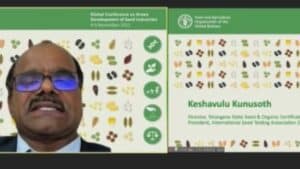The two-day Public-Private Partnership (PPP) Conference arranged by NordGen focused on how researchers and professionals can solve the increasing need to feed the world’s growing population while targeting the climate crisis, according to a release.
The conference, “Use of Genetic Resources in Breeding for Climate Change in the Nordic Region, Why Research and Innovation Do Matter,” took place in early February in Malmö, Sweden and had approximately 150 participates both in person and online. The conference hosted 20 speakers over the course of five sessions and was based off of “Nordic Public-Private Partnership (PPP) for Pre-breeding.”
The first session focused on climate change challenges and how plant breeding can be utilized. Jørgen E. Olesen, professor at Aarhus University, discussed the difficulties of producing more food as the world’s population continues to increase. As the environment becomes more hostile with increasingly variable conditions, researchers and professionals need to produce more food and preserve biomaterials, bioenergy and soil fertility while reducing greenhouse gas emissions.
“Meeting these demands would most likely require a broader range of agricultural crops and thus also of genotypes being grown. It also requires genotypes that can be adapted to the changing environmental conditions, and finally new genotypes need to be developed that contribute to lowering environmental impacts of many different types,” said Olesen. “This is a massive undertaking, where access to germplasm with potential traits that can support this transition is essential.”
After Olesen, Alison Bentley, director of the Global Wheat Program at the International Maize and Wheat Improvement Center (CIMMYT), spoke on how important wheat is to the world and the challenges regarding the adaptations of the plant. The program has worked to develop and improve wheat varieties globally.
“Wheat is pivotal to alleviation of hunger, eaten by 2.5 billion people worldwide. Fifty per cent of the world’s wheat is grown in the Global South where projected yield declines due to climate change will disproportionally impact production,” said Bentley.
There were additional sessions with presentations on new technology, plant breeding improvements and the importance of genebank collections. These collections can be used to develop crops that are climate-adapted.
The conference also featured a panel discussion and a poster session that allowed 21 researchers to present their findings. A conference summary and parts of presentations will be available in the future.













